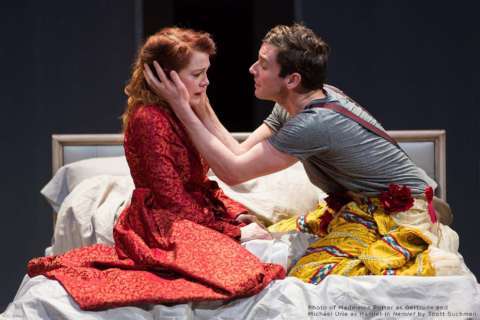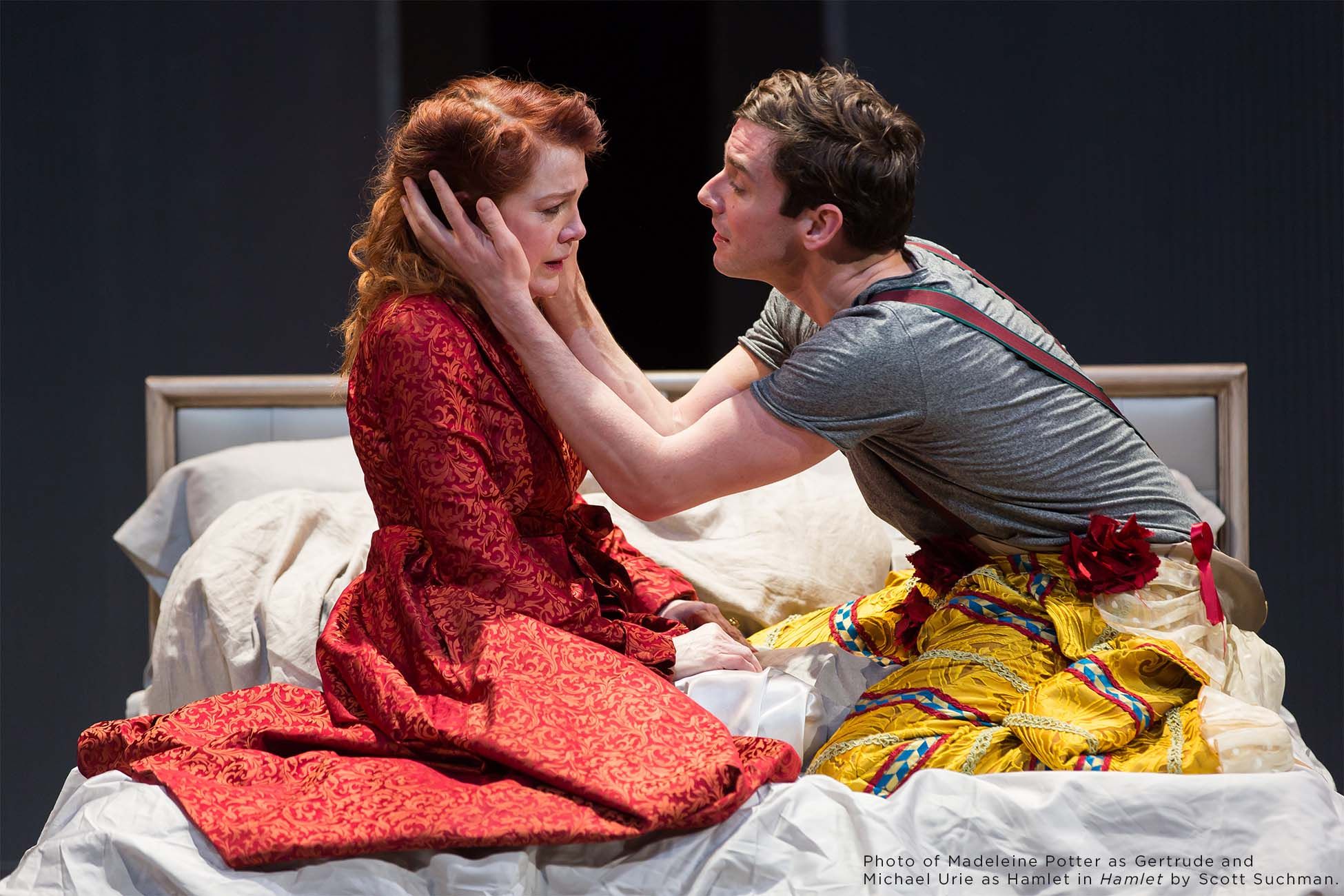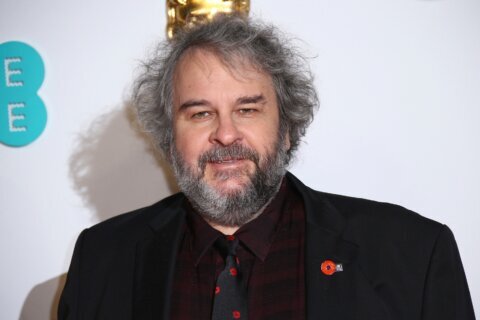WASHINGTON — William Shakespeare’s “Hamlet” is a tragic revenge tale ripe for any era, but you’ve probably never seen it presented quite like this with a modern espionage twist.

That’s the fresh conceit by Shakespeare Theatre Company at Sidney Harmon Hall in Penn Quarter (Jan. 16-March 4), fittingly around the corner from the International Spy Museum.
“Michael Kahn, our director, has really encapsulated this entire production inside the idea of espionage, surveillance and spying,” lead actor Michael Urie told WTOP. “It’s a play about a world in which there’s nothing really private, no one is safe and anyone could be listening at any time. … Anyone’s phone can record any conversation. It’s terrifying, almost ‘Black Mirror.'”
Originally set in Denmark during the Middle Ages, Prince Hamlet (Urie) is visited by the ghost of his late royal father (Keith Baxter), who claims he was murdered by his brother Claudius (Alan Cox), who seized the throne and married the widowed Gertrude (Madeleine Potter).
“He’s been tasked by the ghost of his father to avenge his death,” Urie said. “He’s so distracted by his life and everything going on — the fact that his mother has married his uncle, while his father is accusing his uncle of murder — that he doesn’t know what to do! He doesn’t know if he should trust this ghost, trust his instincts, or just end it all. He’s so sad, so melancholy.”
This melancholic daze is what fuels the play’s most famous soliloquy: “To be or not to be.”
“‘To be or not to be’ is pondering whether to live or not and whether to take one’s own life,” Urie said. “‘To sleep perchance to dream: Aye, there’s the rub.’ What will happen to me after I die? I have no idea. That’s why we don’t just end it, because we don’t know what [awaits].”
The spiritual weight of suicide — and revenge homicide — haunt Hamlet’s conscience.
“Hamlet is a religious person, so he believes in heaven and hell,” Urie said. “He has seen that his ghost father is trapped in purgatory because he was killed before he was able to purge his soul. There’s even a moment where Hamlet has an opportunity to kill his uncle [but] his uncle is on his knees praying. He says, ‘I can’t do it now when he’s fit and set for his passage.'”
By contrast, Hamlet grieves that his own father was killed before getting a chance to repent.
“I say, ‘He took my father grossly, full of bread, with all his crimes broad blown, as flush as May,’ meaning my father didn’t have a chance to purge his sins,” Urie said. “He was the king of Denmark, so there are lots of things he had to do to maintain his kingdom, which I’m sure included murder and warfare that would be considered sins that he would have to purge.”
This universal soul-searching makes “Hamlet” one of Shakespeare’s most timeless works.
“It’s probably the most famous and could be the best,” Urie said. “It’s ultimately a play about mortality. It’s a revenge play at its core. Hamlet is seeking revenge [and] in the process ponders mortality, what life means, what death means. That’s something we all go through. Whether it’s our own mortality or the mortality of those around us, we all can relate to that.”
This particular production is made extra relatable by the aforementioned spy elements.
“We’re in modern dress, wearing suits and dresses and using cellphones,” Urie said. “There’s still a skull and a sword-fight duel, but our duel is done with sabers and these wonderful fencing jackets, masks and technology. When one gets hit, a light goes off like in the Olympics. … A particular love letter that Hamlet sends to Ophelia, in our version it’s a text. And the ghost who appears before these guards, in our production appears first on a surveillance camera.”
It’s fascinating to see how each famous character is woven into the spy arena.
“There are scenes where Claudia and Polonius say we’re going to lure Hamlet here, then send in Ophelia, Hamlet’s girlfriend, and see what she gets out of him — Rosencrantz and Guildenstern, same thing,” Urie said. “My god, look at the world we’re in now! People having conversations, wandering around the West Wing. Who’s leaking? Who’s wearing a wire?”
You also might notice some contemporary similarities on a geopolitical level.
“Claudius is elected, but he sort of turns the world into this authoritarian regime where you do what he bids, secrets are kept and ambassadors are sent to take lands, ” Urie said. “We’re seeing that happen out in the world. Michael talks a lot about Hungary and what’s happening in Eastern Europe. … You will think about the world as we know it while watching ‘Hamlet.'”
Urie is very familiar, having played Horatio 10 years ago at California’s South Coast Repertory.
“Horatio is a tough part because he doesn’t say much, but he’s very vital to ‘Hamlet,” Urie said. “He’s the only person who Hamlet really trusts, and their relationship is key.”
Around that same time, he also starred with America Ferrera in the ABC sitcom “Ugly Betty.”
“It was the greatest,” Urie said. “We’re still very close. The cast remains like a family. It was one of those shows where we started doing it, we loved it, we loved each other, but we had no idea it was going to be such a big hit. It was an out-of-the-gate hit and, for a lot of us, it was our first big break, so we grabbed each other and held on tight and took the ride together.”
Now, he urges his old TV co-stars to come down to Shakespeare Theatre to watch “Hamlet.”
“All of them came to see the last show I was in. We’ll see who makes it down to Washington!”
Click here for more information. Listen to our full conversation with actor Michael Urie below:









